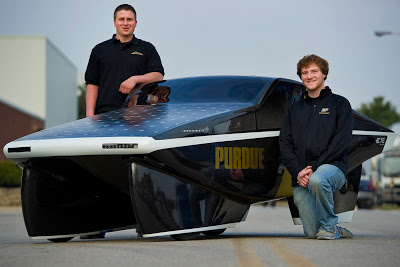The Purdue Solar Racing team’s solar-powered urban commuter car achieved the equivalent of almost 2,200 miles per gallon in the 2011 Shell EcoMarathon international competition this week in Houston. The Purdue team achieved 64.5 miles per kilowatt hour.
The Celeritas prototype can handle a full-sized driver seated upright in a car equipped with headlights, taillights, a trunk, energy regenerative braking, pothole-handling suspension and rearview backup cameras. The car, equipped with five onboard computer systems, generated so much electricity it was in jeopardy of overloading its onboard batteries. Subsequent versions of the car may include an air-conditioning unit to make it even more comfortable and to consume excess electricity. The team is applying for a VIN number and license plate to make it a street-legal experimental vehicle.
The team is drawn from an array of undergraduate programs including mechanical, electrical and computer engineering and aviation technology. It spent one year designing the $90,000 prototype and one year building it.
Results of the 2011 Shell Americas Eco-marathon
Prototype Category
Internal Combustion Engine
First Prize: With a best run of 2,564.8 mpg, the team from Université Laval in Quebec, Canada won a US$5,000 first prize with their vehicle, NTF 5.0.
Second Prize: With a best run of 1,798.7 mpg, the team from Mater Dei High School in Evansville, Ind. won a US$2,500 second prize with their vehicle, Indy.
Gasoline Energy
First Prize: With a best run of 2,564.8 mpg, the team from Université Laval won a US$1,000 first prize with their vehicle, NTF 5.0.
Diesel Energy
First Prize: With a best run of 574.8 mpg, the team from Wawasee High School in Syracuse, Ind. won a US$1,000 first prize with their vehicle, Diesel Weasel.
Alternative Gasoline Energy
First Prize: With a best run of 871 mpg, the team from University of Illinois at Urbana-Champaign in Champaign, Ill. won a US$1,000 first prize with their vehicle, Blue Lightning.
Second Prize: With a best run of 758.7 mpg, the team from Alden Conger High School in Alden, Minn. won a US$1,000 second prize with their vehicle, Green Machine.
Alternative Diesel Energy
First Prize: With a best run of 179.1 mpg, the team from St. Paul’s School in Covington, La. won a US$1,000 first prize with their vehicle, Clawzz.
Fuel Cell/Hydrogen
First Prize: The Cicero North Syracuse High School team from Cicero, N.Y. achieved 44.1mi/kWh and won a US$1,500 first prize with their Clean Green Machine vehicle.
Second Prize: The Lamar University team from Beaumont, Texas achieved 29.3 mi/kWh and won a US$1,000 second prize with their vehicle, Shell Shocker.
“Plug-in” battery
First Prize: The Mater Dei High School team achieved 386.2 mi/kWh and won a US$1,500 first prize with their vehicle, 7th Gen.
Second Prize: The Grand Rapids High School team from Grand Rapids, Minn. achieved 237.7 mi/kWh and won a US$1,000 second prize with their vehicle, X~of~L.
Solar Power
First Prize: The Drexel University team from Philadelphia, Pa. won a US$1,500 first prize with their solar vehicle, Green Dragon, which achieved 89.7 mi/kWh.
UrbanConcept
Internal Combustion Engine
First Prize: With a best run of 646.7 mpg, the team from Louisiana Tech University in Ruston, La. won a US$5,000 first prize with their vehicle, Roadster.
Second Prize: With a best run of 586.6 mpg, the team from Mater Dei High School won a US$2,500 second prize with their vehicle, George.
Gasoline Energy
First Prize: With a best run of 646.7 mpg, the team from Louisiana Tech University won a US$1,000 first prize with their vehicle, Roadster.
Diesel Energy
First Prize: With a best run of 186.5 mpg, the team from Granite Falls High School in Granite Falls, Wash. won a US$1,000 first prize with their vehicle, Philippe’s Bulldozer 2.0.
Fuel Cell/Hydrogen
First Prize: The University of Missouri team from Columbia, Mo. Achieved 13.8 mi/kWh and won a US$1,500 first prize with their vehicle, Tigergen 2.
Solar Power Energy
First Prize: The Purdue University team from West Lafayette, Ind. won a US$1,500 first prize with their solar vehicle, Celeritas, which achieved 64.5 mi/kWh.
If you liked this article, please give it a quick review on ycombinator or StumbleUpon. Thanks

Brian Wang is a Futurist Thought Leader and a popular Science blogger with 1 million readers per month. His blog Nextbigfuture.com is ranked #1 Science News Blog. It covers many disruptive technology and trends including Space, Robotics, Artificial Intelligence, Medicine, Anti-aging Biotechnology, and Nanotechnology.
Known for identifying cutting edge technologies, he is currently a Co-Founder of a startup and fundraiser for high potential early-stage companies. He is the Head of Research for Allocations for deep technology investments and an Angel Investor at Space Angels.
A frequent speaker at corporations, he has been a TEDx speaker, a Singularity University speaker and guest at numerous interviews for radio and podcasts. He is open to public speaking and advising engagements.



